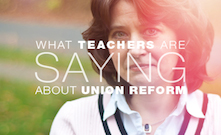Media

What Does $200 Mean To You?
As educators, we’re all working through end-of-year projects and tests with our students before we break for the winter holidays. For me, December brings more than decorating, baking and precious time under the Christmas tree with family. It’s also the month I get what’s called a Hudson notice from my school district’s union, the Pennsylvania State Education Association. Because I opted not to join the union, but work in an “agency shop” school district, I still have to pay the union a portion of annual teacher dues–about $450 a year. That’s roughly $200 less than a full-time teacher and PSEA member pays.
The Hudson notice informs me how the union calculates my fair share fee. In many ways, having decided not to join the union, I wish I didn’t have to pay anything at all. Even for my compensation and working conditions, I’d prefer to represent myself. Based on my First Amendment rights, my money shouldn’t have to support an organization I elected not to join. But at the very least, being a fee payer brings me important benefits.
I chose not to join the PSEA based on my religious beliefs, and my fair share fee now goes to my school’s scholarship fund every year. So for me, not paying an additional $200 means my money does not support political and other views with which I disagree. Make no mistake: Union member dues can indeed legally fund many types of political activities. Only fee payers are protected by law against any of their money going towards politics. For more on this, and how to become a fee payer, please check out 5 Facts on Fair Share Fees at Free to Teach.
For me, the $200 I save as a fee payer means I can shield my freedom of association and free speech rights. As we head into a new year, you should decide, too, what $200-or perhaps nearly $700 in member dues-means to you.
I hope you have a wonderful holiday break!
– Jodie
Jodie Kratz
Special Education Teacher
Central Dauphin School District